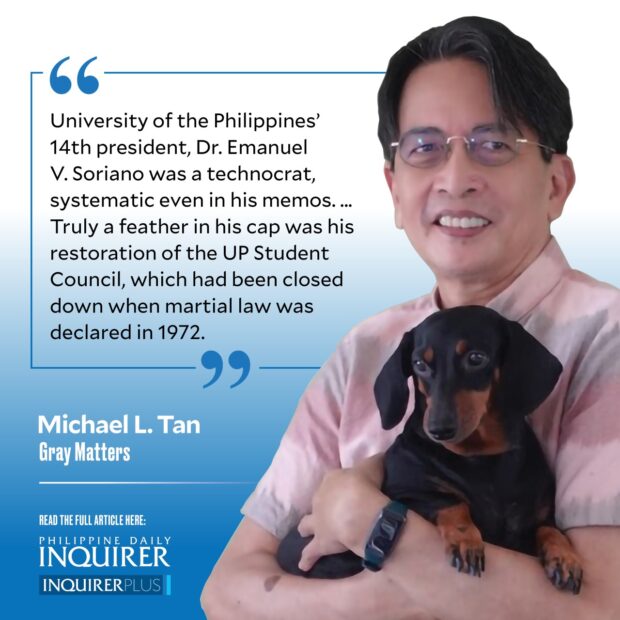Leadership and presence (2)
 Last week, I wrote about the passing of the University of the Philippines’ (UP) 14th president, Dr. Emanuel V. Soriano, and how I found myself grieving, even if I was not even in the Philippines during his presidency, never had him as a teacher, or worked with him as an administrator.
Last week, I wrote about the passing of the University of the Philippines’ (UP) 14th president, Dr. Emanuel V. Soriano, and how I found myself grieving, even if I was not even in the Philippines during his presidency, never had him as a teacher, or worked with him as an administrator.
Chari Lucero, who has been editing “A History of the University of the Philippines,” graciously provided me with an advance copy of a chapter, “Technocrat with a Social Conscience,” coming out in the next volume of that history, covering the time of Soriano. Reading just the first few pages, I could see why he is considered one of our greater leaders. I’m referring to the way he started his presidency by launching numerous consultations with faculty — college by college even — as well as staff, students, and even residents of the UP campus.
Chari’s chapter on Soriano was a long one, covering 123 pages, yet Soriano’s term as president was short (1979-1981). Of course, that was preceded by several years as executive vice president to O.D. Corpuz. Soriano was a technocrat, systematic even in his memos. He once issued guidelines on handling bomb threats that were so systematic they could have served as a handbook for putting together a bomb!
Article continues after this advertisementMore importantly, his memos were very goal-oriented. I was fascinated to learn that as executive vice president, he initiated procedures for choosing college deans. I had always thought the procedures had always been there.
The first guidelines were for the College of Arts and Sciences (CAS). Years later, CAS split into three colleges. I was dean of the College of Social Sciences and Philosophy, and appreciated the procedures in the way it safeguarded the college from external interference, including from the Board of Regents.
Truly a feather in his cap was his restoration of the UP Student Council, which had been closed down when martial law was declared in 1972. The Marcos dictatorship’s “interest” in UP affairs was much more drastic than in recent Duterte times. For example, in 1977, UP lost its fiscal autonomy. Our budget merged with that of the Department of Education, with many cutbacks and limits.
Article continues after this advertisementBut Soriano held the fort for as much as he could … sometimes with humor. When the education department ordered him to implement a “Loyalty and Arbor Day” for mandatory tree planting on Sept. 11, not coincidentally Ferdinand Marcos Sr.’s’ birthday, Soriano issued the order but described the day as one for pledging “loyalty to the nation and the university,” no mention of Marcos or his birthday.
Soriano’s sense of humor served less political purposes. As executive vice president, he entitled one memo “Economy of Paper, Time, Words, Energy, Other Apposite Items.” Turned out it wasn’t just about cost-cutting. His calls for frugality called on UP to limit their paperwork to “matters of great paperweight,” proposing that “a measure of the essential economy of communication” and that one could be clear in half a sheet of paper.
* * *
There’s so much more in Chari Lucero’s chapter but I should get back to the present and explain why I find myself missing Soriano.
Early in my term as UP Diliman chancellor, I noticed that Soriano was present in so many of our events, from concerts at the College of Music to Diliman’s general commencement exercises. There were times I was tempted to have a roll call of officials just to show that our wheelchair-bound former president was better at attending our events. It also got to the point where I would fret not seeing him at an activity, and asking if he was arriving because I just felt it was improper to start without him.
When he was present, I’d make it a point to go up to him for short conversations. He had difficulties at times with his speech but there was this warmth and sincerity — he truly wanted to be at the event, truly wanted to be in UP. Now that I’ve read about his accomplishments, I will miss him for the presence of an extraordinary kind, one that pervaded his leadership positions, but which continued for years after his retirement, an extraordinary presence that should be considered a hallmark of leadership.
















